- Home
- J. T. Edson
Cap Fog 4 Page 4
Cap Fog 4 Read online
Page 4
‘I too am puzzled by that, Colonel,’ the detective admitted, dropping a spare magazine into each of his jacket’s pockets. ‘And I wonder how they induced him to participate? They, of course, would require somebody who is fully cognizant with the geography of London and the different … um … regulations pertaining to the driving of a motor vehicle in this country. Oh well. When Inspector Mudgkin condescends to put in an … um … appearance, we—if I may make so bold as to assume that you will accompany me, Colonel—will endeavor to discover the … um … answers.’
Chapter Four—Got You, You Little Bas—!
Charles Cuthbert Horace Wagon was in an even viler and more unpleasant frame of mind than was usual for him as he cantered into Little Venner on his big bay hunter. A light rider for all his bulk, capable of taking much less out of his mount than would a smaller but not so skillful person, he invariably exerted his control with far more force than was necessary. Sensing his evil mood, the horse moved warily and was alert to respond to his slightest signal less worse should befall it. Scowling along the village’s main street, he rode past the Royal Colors Hotel without giving it a glance and made for the second, smaller licensed establishment, the Starter’s Hack.
Everything, the trainer told himself and not for the first time, was going wrong on what ought to have been a pleasant and relaxing Sunday.
It was bad enough having Him on the premises, in addition to all the foreigners He had been sending since His proposition had been put to and accepted by Wagon. Now two more damned guests—if one could call them that—were arriving. The thought of having a woman—especially that particular woman—in the house was anything but conducive to a sense of contentment and well-being for the trainer.
Not that Wagon had mentioned his misgivings.
One did not argue against His requirements and demands!
Not twice, anyway!
Wagon felt as if he had been touched by a cold hand at the recollection of the tantrum He had thrown when He had learned that the only car at the training stable, on His own insistence to avoid attracting unwanted attention, had broken down and would not be able to collect Her from the railway station at Swindon. As if the failure of the car had not been sufficient of a misfortune, the only vehicle for hire locally was already taken and unobtainable before Monday morning.
Remembering His rage and the fear displayed by His attendants, who had not previously appeared to the trainer to be men who were easily frightened, Wagon wished that He had chosen somebody else to help implement His remarkable scheme.
Or that Wagon had refused it in the first place.
Yet there had been nothing else the trainer could do except accede to the circumstances. Already in dire financial straits as a result of making several unfortunate selections when betting on other people’s racehorses, he had recently suffered a very serious business reversal. A certain little gentleman 26 of a tipster—one Educated Evans of Bayham Mews, Camden Town—had ruined a carefully prepared coup by giving out the name of the animal with which Wagon had planned to win the Braxted Selling Welter at Birmingham. 27 Although Little Buttercup had romped home an easy winner, helped by a certain noxious potion administered shortly before the race commenced, the volume of wagering induced by Evans’ communiqué had caused the odds to shorten from a healthy thirty-five to one as far as a decidedly unadvantageous and hardly acceptable eight to one on. 28 The result was that, instead of the anticipated solvency—and the possibility of another call to appear before the Stewards of the Meeting to explain the remarkable improvement in his entry’s erstwhile uninspiring performance, which did not worry him as much as one might imagine, due to his having survived similar ordeals on three previous occasions—he had found himself too close to bankruptcy to turn down His potentially lucrative proposition.
As if wishing to prove that it never rains but what it pours, as the old saying claims, there had been the discovery of the something-or-other, so-and-so trespasser coming towards the Orchard Meadow to add to Wagon’s misfortunes. Of course, providing that the two “stable hands” carried out their instructions and said nothing about the incident, He would not have heard what had happened.
Thinking about the affair, the trainer scowled in puzzlement. He wondered what the strangely dressed young man had been up to. While smallish, he was somewhat too large to have been a jockey in search of employment. Or, if that was all he had been, he would have come straight along the front drive to the house and made his request. Anybody so deeply connected with the business of horseracing would have known better than to be found wandering around unbidden on Charlie Wagon’s property.
On the other hand, while shortly after noon on Sunday might appear a poor time to gather unauthorized information, Wagon was notorious for working his horses at peculiar hours when more reputable stables were resting. So the visitor could have been a tout. However, Wagon had never seen one of that detestable fraternity clad in such strange attire. Generally, having no desire to draw unwanted attention to themselves or be easily identifiable, they tended to wear garments which would blend with the clothing of the local population.
The garb of the intruder had been unlike anything the trainer had ever come across locally or even during visits to London.
Considering the latter aspect opened up a whole new line of conjecture for Wagon.
The trespasser must be a foreigner. In fact, his attire seemed similar to that worn in “cowboy” motion pictures which the trainer had seen at cinemas.
One thing was certain!
The small young man had not come at His bidding. Several of His employees had been brought from the United States of America, but they wore much the same kind of clothing as the English occupants of the stables. Furthermore, they and the other foreigners had arrived, if unconventionally, in the means pre-arranged by Him. None of them had put in an appearance by sneaking furtively across the fields.
Once again, Wagon experienced a chilling sensation!
What if He had instructed the intruder as a means of testing the way in which the property was being guarded?
There was some slight consolation for the trainer in the latter thought. The prevention of unwanted observers was the responsibility of His second-in-command. What was more important, although Wagon had failed to capture the stranger, he had been driven off before he could come into visual distance of the stables.
Giving consideration to how the intruder had escaped, Wagon did not care for some of the possibilities that opened up. He had recognized the rescuer as General Snowhill’s niece and he knew his neighbor to be one of that exclusive coterie who supplied the Stewards for every major race course in the United Kingdom.
Had some hint of His scheme leaked out?
If so, the Jockey Club was certain to investigate!
After some earnest and worried thought, Wagon decided against the assumption. From what he knew of them, that august body would employ more subtle tactics. Perhaps the Snowhill girl had been acting on her own initiative, attempting to find out if he was up to something in his normal line of suspected malpractice. Or she and the young man could merely have been trying to win one of the stupid kind of bets in which members of the pampered Upper Glass frequently indulged. Or, remembering the squealing of her car’s brakes just after the intruder had vaulted the gate, she might not have been connected with him and merely helped him out of a misguided sense of compassion.
In which case, what had the interloper been hoping to do?
Reaching the front of the Starter’s Hack public house caused Wagon to bring an end to his cogitations. He looked at the deserted pavement, then dismounted. There was a large, enclosed yard with an exit at the rear of the building where horses could be left. It was a facility of which many of the customers, wishing to avoid letting it be known they were on the premises, frequently availed themselves. Having no need for such a subterfuge, in fact being one of the reasons for it, he tied the hunter’s reins to a ring on one of the hitching posts which were nece
ssitated by the area’s main industry.
Crossing the pavement, Wagon opened the front door and stepped into the tap-room of the Starter’s Hack. As might be expected, with the proprietor once having been a noted jockey, the leitmotif had to do with the Sport of Kings. There were framed photographs of the owner seated on his most successful mounts, or pictures of celebrated racehorses, around the walls. Sets of the special horseshoes known as “racing plates”, bits and stirrup irons formed the other decorations. The only reading matter in evidence was copies of The Calendar, or other journals equally devoted to training, racing and wagering on horses.
‘Good morning, Mr. Haggerty,’ the trainer greeted, directing a look of what—for him—passed as cordiality at the small, wizened, bow-legged and gray-haired man who was standing behind the bar counter. He hated to employ the honorific when addressing one whom he regarded as a social inferior, but had come to ask a favor. ‘Nice weather.’
‘Aye, it’s not bad,’ agreed the proprietor, with less cordiality than might have been expected in view of the fact that he was alone in the room and addressing a potential customer. ‘I haven’t seen any of your lads this morning.’
There was a good reason for the second comment. The inborn British trait of an unwillingness to mingle with people outside one’s kind and social level had caused the Starter’s Hack to become the province of the local racing fraternity’s lower echelons. As a further subdivision, while apprentices and stable-lads mingled freely in the tap-room, jockeys and head lads would only be found in the adjoining lounge. However, except upon Christmas and Boxing Days, or New Year’s Eve, when the barriers were traditionally relaxed by common consent, such exalted personages as trainers and owners gave their custom to the more elegant Royal Colors Hotel. When one of them came in to the Starter’s Hack at other than those festive occasions, particularly when it was Charlie Wagon, Mr. Haggerty was usually suspicious and wondered if the arrival was to check up on his normal clientele.
‘I wasn’t looking for them,’ the trainer replied, knowing what had been meant, but still trying to retain his air of amiability. ‘My car’s broken down and—’
Before Wagon could complete his explanation and request the loan of the proprietor’s vehicle, the opening of the back door drew his gaze in that direction. Although the person who had been about to enter changed his mind and retreated hurriedly, the trainer had caught a glimpse of him.
A low growl of rage burst from the trainer and he darted across the room. In spite of only having been granted a brief sight, he had identified the newcomer as the smallish trespasser who had evaded his wrath earlier. There could hardly be two men in a village the size of Little Venner, nor the whole of Wiltshire for that matter, who dressed in such an outlandish fashion.
Watching Wagon dashing towards the back door, Mr. Haggerty gave vent to a startled and profane exclamation. He did not know what the trainer might have against the short, strangely dressed and funny sounding young man who had taken room in his premises. However, it was obvious something was wrong and he was aware of Wagon’s reputation where people who crossed him were concerned.
Wishing to prevent any unpleasantness in his house, the proprietor started to walk from behind the counter. A serious injury to his leg, which had caused him to give up his career as a jockey and also precluded him from taking employment as a stable’s head lad, restricted the speed at which he could move. So, by the time he was approaching the door, Wagon and the small stranger had already left the building. Nor was he able to see them as the exit to the back yard was almost closed. All he could hear from outside increased his sense of perturbation.
‘Got you, you little bas—!’ Wagon’s voice bellowed, beginning to employ one of his favorite terms for anybody who earned his disapproval.
The word went unfinished!
There sounded a rapid scuffling noise, followed by a startled wail something like, ‘Augh!’ from the trainer. It was followed by a thud similar to that of a bale of hay being dropped to the ground.
Limping the remaining few feet as swiftly as he could manage, Mr. Haggerty hardly knew what to expect as he opened the back door. Stepping through, he found that there was no sign of the small stranger. Not that the proprietor gave much consideration to his absence, nor where he might have gone. Instead, the publican stared at Wagon, sprawling supine on the ground.
‘What happened?’ Mr. Haggerty demanded, approaching as the trainer sat up.
‘Wh—Where is—?’ Wagon gasped, glaring around in a dazed fashion. Then he shook his head. When he continued speaking, it was obvious that he had recovered his wits if not his composure. ‘I … tripped over your something-or- other, so-and-so yard brush, that’s what!’
There were, Mr. Haggerty decided, certain objections—although he had no intention of mentioning them, unless he was given cause—to the explanation. For one thing, Wagon had been lying on his back and with his feet pointing towards the gate in the yard’s wall. He should not have attained such a position if he had arrived there from the kind of accident he had described.
However, the chief argument against the trainer’s statement was that there was no brush anywhere in the yard.
Chapter Five—I Have This Peculiar Perversion
‘American gangsters,’ challenged Inspector Mudgkin, heavily built in his blue uniform, his harsh voice redolent of disbelief as he interrupted Mr. J. G. Reeder’s explanation of the would be assassination.
On his arrival, accompanied by a detective sergeant and two other cars filled with officers, Mudgkin had listened to Mr. Reeder’s description of the attackers and their vehicle. On learning that the Clyno Royal sedan had gone in the direction of Deptford, without waiting to hear anything further, he had ordered the men in the two cars to go and institute a search. What was more, he had brushed aside Mr. Reeder’s warning of how dangerous the party they were seeking would be. Having dispatched his small force, he had requested that he was given a full report of the incident. So Mr. Reeder had suggested he and the detective sergeant went into Daffodil House. Taking them and Colonel Brian Besgrove-Woodstole into the dining room and seating them at the table, he had started to comply.
‘Their names are Joseph “Joe the Actor” Steffens, Generoso Rizzito and Giovanni Aiello,’ Mr. Reeder supplemented in gentle tones, eyeing the Inspector with what might have passed for benevolence to anybody who knew him less well than either Besgrove-Woodstole or Sergeant Rudge. ‘Born in New York, Detroit and Chicago respectively, which suggests they are … um … Americans. As for the rest, a colleague of mine domiciled in the United States, Mr. Eliot Ness—who, in my modest … um … summation, wall make a major contribution to the law enforcement of that country 29 —has written and told me sufficient to lead me, possibly erroneously, to conclude that they might also be … um … gangsters.’
Catching the detective sergeant’s eye, after seeing the frown that came to Mudgkin’s face, Besgrove-Woodstole exchanged a quick smile with him. Mr. Reeder being hesitantly apologetic was capable of producing a tremendous amount of cutting sarcasm.
Apparently oblivious of the Inspector’s disapproval, Mr. Reeder continued with his explanation. He spoke concisely, describing the modus operandi of the American trio with none of his usual hesitant delivery and sounding far younger than he looked.
When a contract was received to make a kill, Steffens would frequently allow himself to be knocked down by a car carrying Rizzito and Aiello outside wherever their victim was located. In addition to giving a most realistic performance of being struck and thrown over the vehicle’s bonnet, using the technique he had perfected as a stuntman in the motion picture industry, he also demonstrated how he acquired the name “Joe the Actor” by posing as the kind of person most likely to arouse the victim’s sympathy. The garb of a Catholic priest had lured an Italian-born gang-boss from the safety of his headquarters and a rabbi’s attire had brought a Jewish accountant, who had to be prevented from giving evidence in a criminal case, out of his hous
e and to his death.
One of the trio’s precautions was always to hire a driver who had a complete knowledge of the city in which they were working, ensuring there would be no mistakes during their flight from the scene of the crime. That would be more essential than ever, Mr. Reeder pointed out, in London. Not only were they unfamiliar with the geography of the city, but they would have been compelled to work under the added disadvantage of remembering the vehicle must be driven on the left and not the right side of the street.
‘Whoever arranged for my … um … removal knew that I would be sitting here and having my lunch, with a clear view of the road from my table,’ Mr. Reeder went on. ‘And, seeing what I took to be a constable struck by a motor car, I would go out to investigate. There is, however, … um … one point which I must confess puzzles me. How they could be sure that the genuine constable would not appear inconveniently. Doubtless they had anticipated and taken care of that contingency.’ 30
‘When did you find out those Yankees were over here, Mr. Reeder?; Rudge asked.
‘I had no idea that they were, Sergeant,’ the detective answered. ‘However, because of “Bert the Jump-Up’s” well known predilection for such … um … attire, I recognized him and noticed that the “constable” seemed puzzled when he could not have duplicated my recognition, nor even been able to read the license plate and … um … discover that the vehicle was stolen. As I may have mentioned, I have this peculiar perversion—’
‘Your “criminal mind”,’ Besgrove-Woodstole supplied with a frosty grin.
‘As you so succinctly put it, Colonel, my … um … criminal mind,’ Mr. Reeder agreed. ‘It is a terrible affliction, but suggested what … um … might be about to happen.’
‘Then you knew they were after you?’ Mudgkin asked.

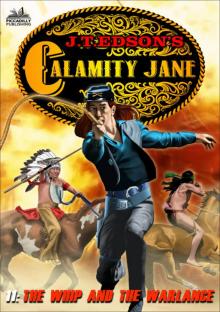 Calamity Jane 11
Calamity Jane 11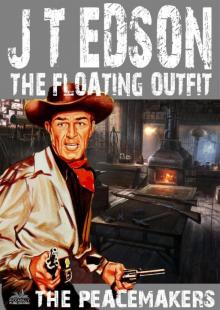 The Floating Outift 33
The Floating Outift 33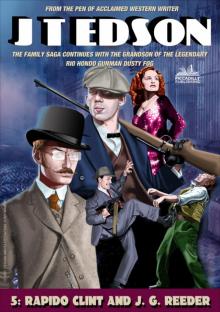 Cap Fog 5
Cap Fog 5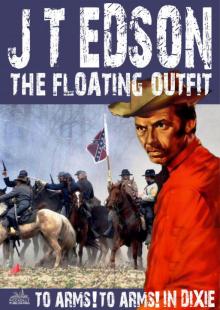 The Floating Outfit 34
The Floating Outfit 34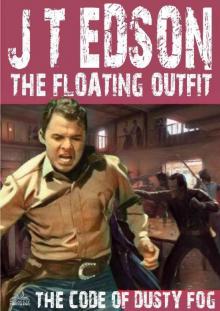 The Code of Dusty Fog
The Code of Dusty Fog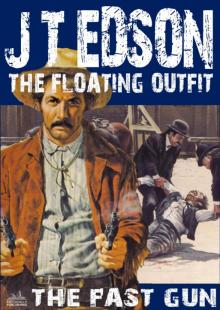 The Floating Outfit 21
The Floating Outfit 21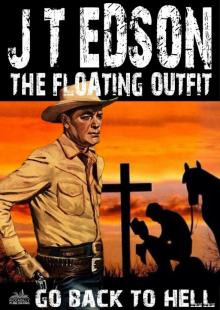 The Floating Outift 36
The Floating Outift 36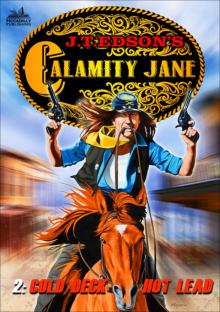 Calamity Jane 2
Calamity Jane 2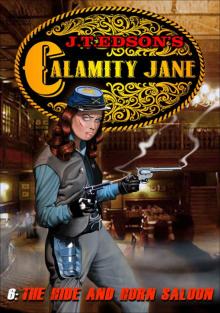 Calamity Jane 6: The Hide and Horn Saloon (A Calamity Jane Western)
Calamity Jane 6: The Hide and Horn Saloon (A Calamity Jane Western)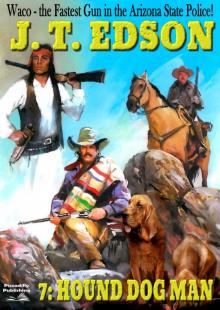 Waco 7
Waco 7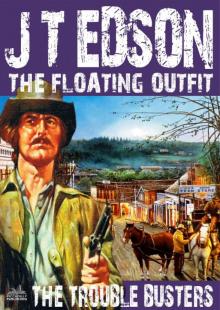 The Floating Outfit 25
The Floating Outfit 25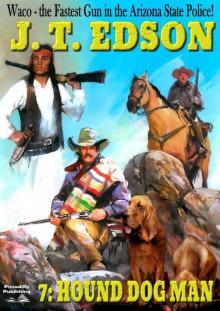 Waco 7: Hound Dog Man (A Waco Western)
Waco 7: Hound Dog Man (A Waco Western)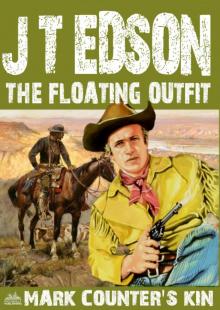 The Floating Outfit 47
The Floating Outfit 47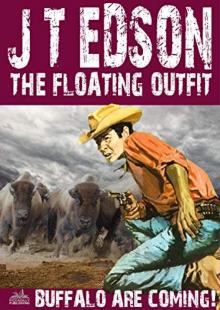 The Floating Outfit 42: Buffalo Are Coming!
The Floating Outfit 42: Buffalo Are Coming!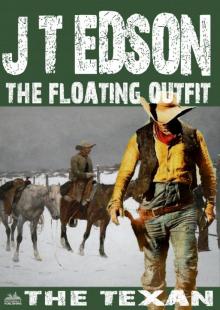 The Floating Outfit 46
The Floating Outfit 46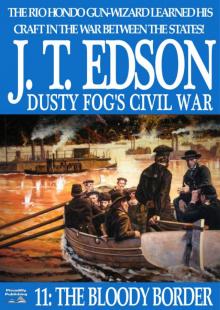 Dusty Fog's Civil War 11
Dusty Fog's Civil War 11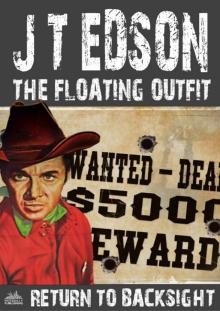 The Floating Outfit 61
The Floating Outfit 61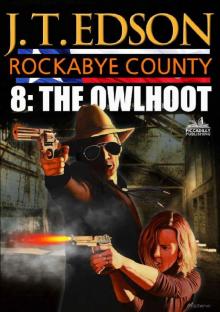 The Owlhoot
The Owlhoot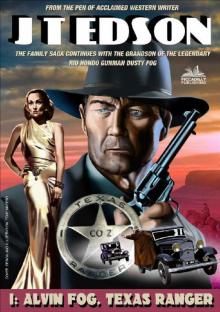 Alvin Fog, Texas Ranger
Alvin Fog, Texas Ranger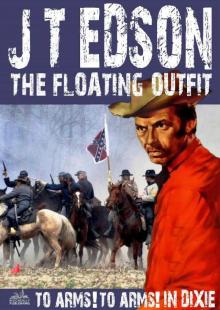 The Floating Outfit 34: To Arms! To Arms! In Dixie! (A Floating Outfit Western)
The Floating Outfit 34: To Arms! To Arms! In Dixie! (A Floating Outfit Western)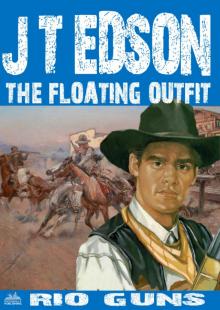 The Floating Outfit 44
The Floating Outfit 44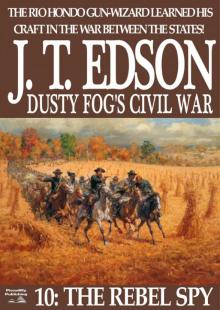 Dusty Fog's Civil War 10
Dusty Fog's Civil War 10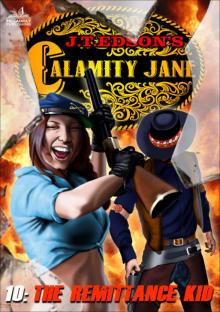 Calamity Jane 10
Calamity Jane 10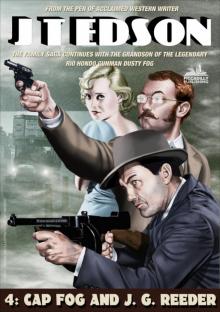 Cap Fog 4
Cap Fog 4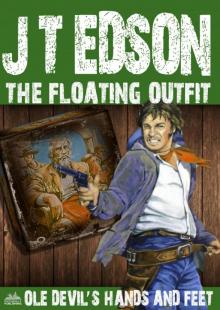 The Floating Outfit 51
The Floating Outfit 51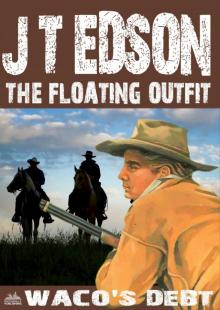 The Floating Outfit 50
The Floating Outfit 50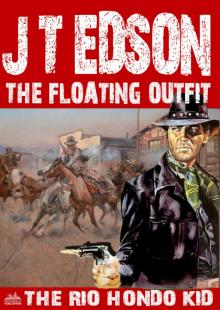 The Floating Outfit 49
The Floating Outfit 49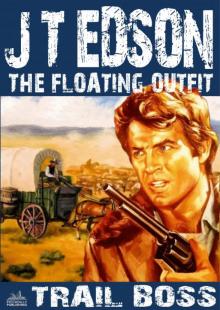 The Floating Outfit 10
The Floating Outfit 10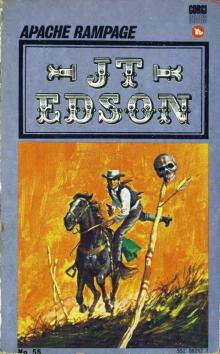 Apache Rampage
Apache Rampage The Floating Outfit 15
The Floating Outfit 15 Ranch War
Ranch War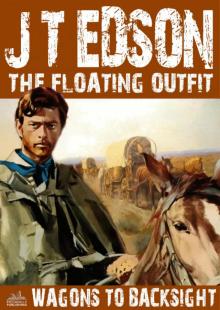 The Floating Outfit 11
The Floating Outfit 11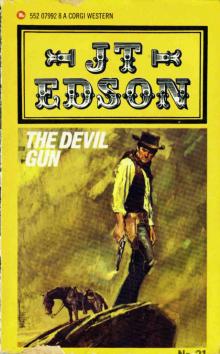 The Devil Gun
The Devil Gun Sacrifice for the Quagga God (A Bunduki Jungle Adventure Book 3)
Sacrifice for the Quagga God (A Bunduki Jungle Adventure Book 3) Comanche (A J.T. Edson Western Book 1)
Comanche (A J.T. Edson Western Book 1)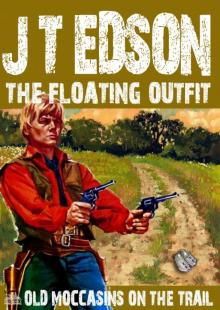 The Floating Outfit 48
The Floating Outfit 48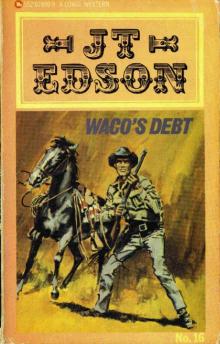 Wacos Debt
Wacos Debt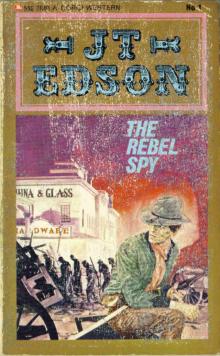 The Rebel Spy
The Rebel Spy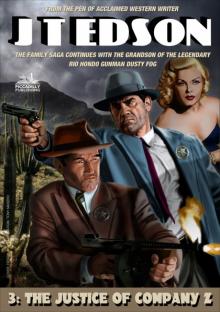 Cap Fog 3
Cap Fog 3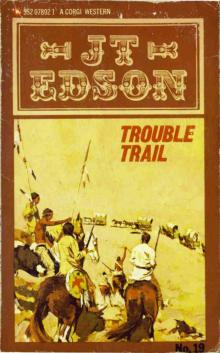 Trouble Trail
Trouble Trail Cold Deck, Hot Lead
Cold Deck, Hot Lead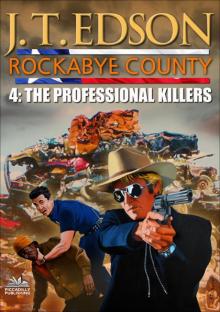 Rockabye County 4
Rockabye County 4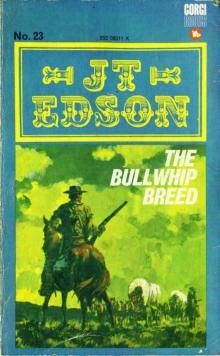 The Bullwhip Breed
The Bullwhip Breed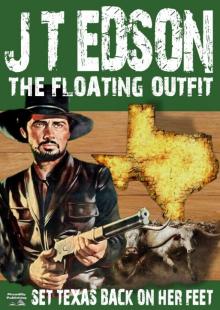 Set Texas Back On Her Feet (A Floating Outfit Western Book 6)
Set Texas Back On Her Feet (A Floating Outfit Western Book 6)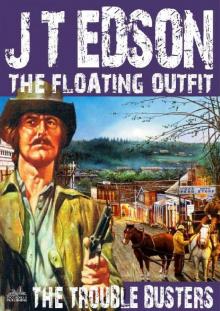 The Floating Outfit 25: The Trouble Busters (A Floating Outfit Western)
The Floating Outfit 25: The Trouble Busters (A Floating Outfit Western) Fearless Master of the Jungle (A Bunduki Jungle Adventure
Fearless Master of the Jungle (A Bunduki Jungle Adventure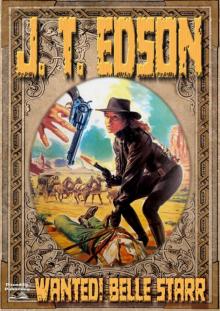 Wanted! Belle Starr!
Wanted! Belle Starr! The Big Hunt
The Big Hunt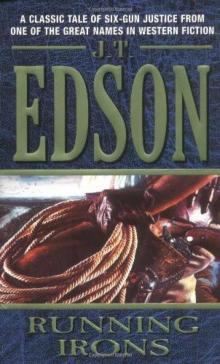 Running Irons
Running Irons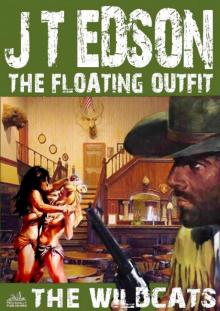 The Floating Outfit 19
The Floating Outfit 19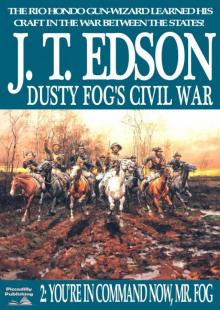 You're in Command Now, Mr Fog
You're in Command Now, Mr Fog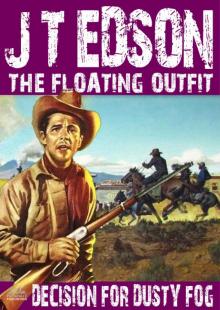 The Floating Outfit 27
The Floating Outfit 27 Texas Killers
Texas Killers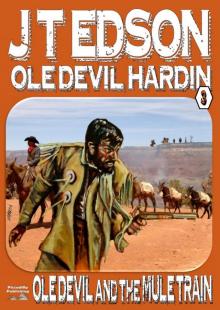 Ole Devil and the Mule Train (An Ole Devil Western Book 3)
Ole Devil and the Mule Train (An Ole Devil Western Book 3) Bunduki and Dawn (A Bunduki Jungle Adventure Book 2)
Bunduki and Dawn (A Bunduki Jungle Adventure Book 2)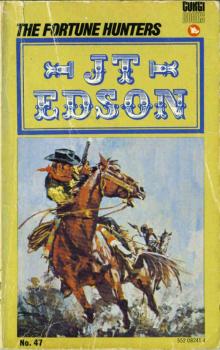 The Fortune Hunters
The Fortune Hunters The Floating Outfit 12
The Floating Outfit 12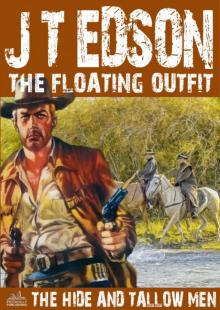 The Hide and Tallow Men (A Floating Outfit Western. Book 7)
The Hide and Tallow Men (A Floating Outfit Western. Book 7)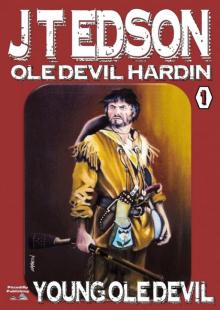 Young Ole Devil
Young Ole Devil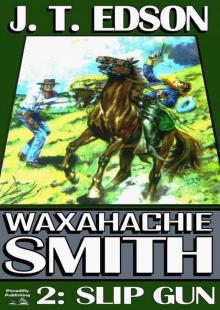 Slip Gun
Slip Gun The Drifter
The Drifter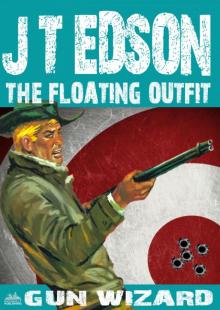 The Floating Outfit 45
The Floating Outfit 45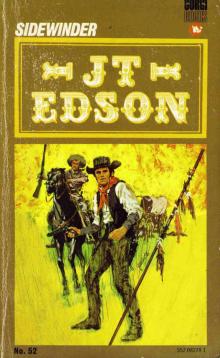 Sidewinder
Sidewinder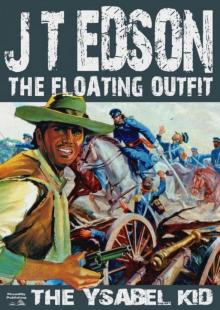 The Ysabel Kid
The Ysabel Kid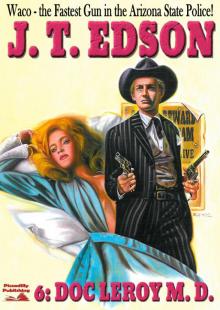 Waco 6
Waco 6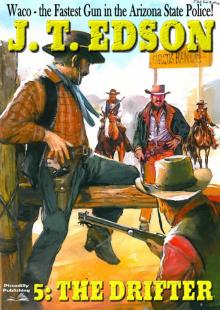 Waco 5
Waco 5 Point of Contact
Point of Contact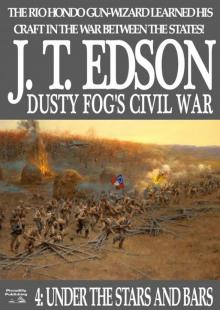 Under the Stars and Bars (A Dusty Fog Civil War Western Book 4)
Under the Stars and Bars (A Dusty Fog Civil War Western Book 4)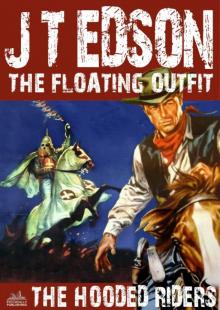 The Floating Outfit 9
The Floating Outfit 9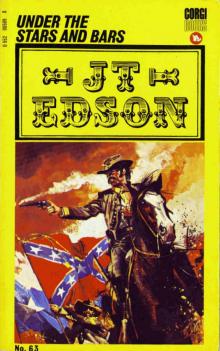 Under the Stars and Bars
Under the Stars and Bars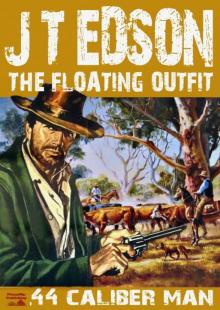 .44 Caliber Man
.44 Caliber Man The Floating Outfit 17
The Floating Outfit 17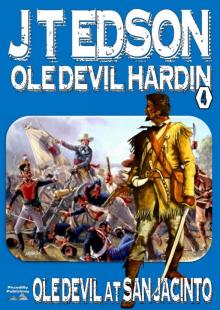 Ole Devil at San Jacinto (Old Devil Hardin Western Book 4)
Ole Devil at San Jacinto (Old Devil Hardin Western Book 4)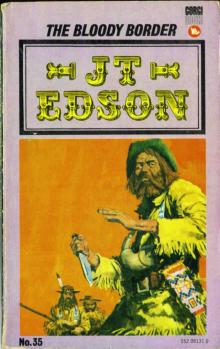 The Bloody Border
The Bloody Border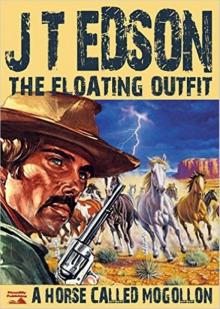 A Horse Called Mogollon (Floating Outfit Book 3)
A Horse Called Mogollon (Floating Outfit Book 3)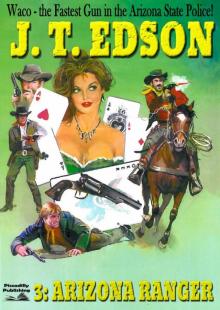 Waco 3
Waco 3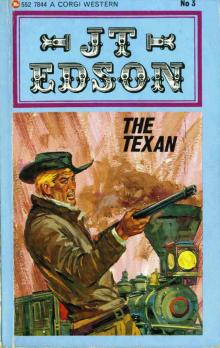 The Texan
The Texan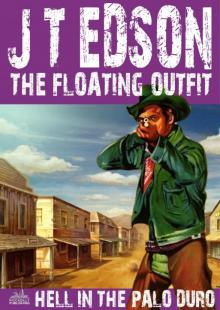 The Floating Outfit 35
The Floating Outfit 35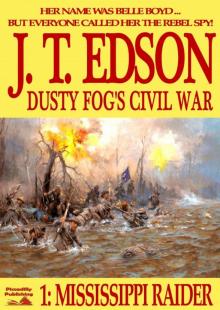 Mississippi Raider
Mississippi Raider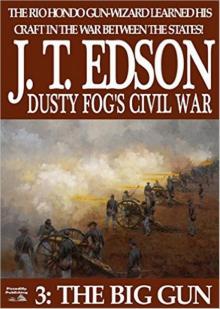 The Big Gun (Dusty Fog's Civil War Book 3)
The Big Gun (Dusty Fog's Civil War Book 3)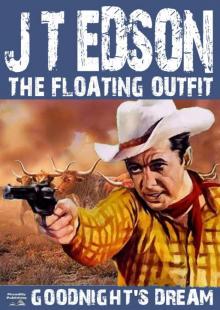 Goodnight's Dream (A Floating Outfit Western Book 4)
Goodnight's Dream (A Floating Outfit Western Book 4) Waco 4
Waco 4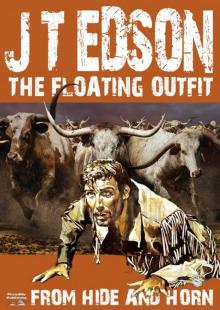 From Hide and Horn (A Floating Outfit Book Number 5)
From Hide and Horn (A Floating Outfit Book Number 5)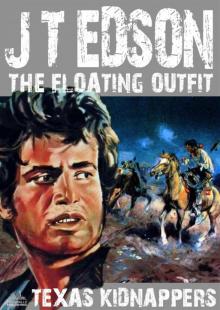 The Floating Outfit 18
The Floating Outfit 18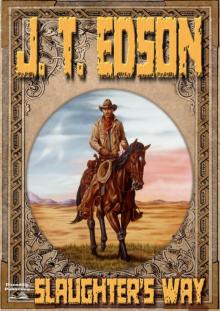 Slaughter's Way (A J.T. Edson Western)
Slaughter's Way (A J.T. Edson Western)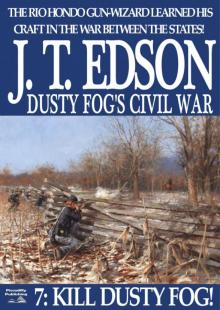 Dusty Fog's Civil War 7
Dusty Fog's Civil War 7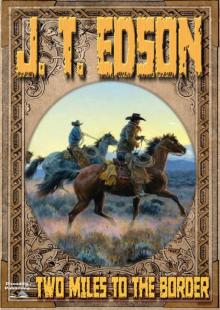 Two Miles to the Border (A J.T. Edson Western)
Two Miles to the Border (A J.T. Edson Western)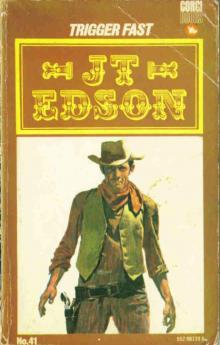 Trigger Fast
Trigger Fast Waco's Badge
Waco's Badge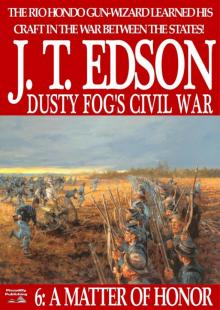 A Matter of Honor (Dusty Fog Civil War Book 6)
A Matter of Honor (Dusty Fog Civil War Book 6)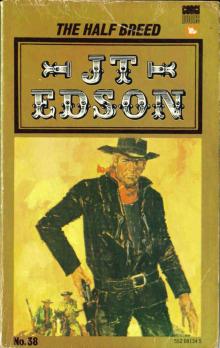 The Half Breed
The Half Breed Bunduki (Bunduki Series Book One)
Bunduki (Bunduki Series Book One)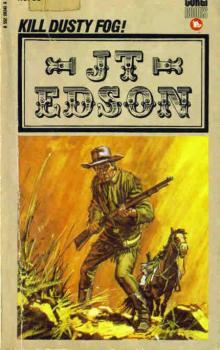 Kill Dusty Fog
Kill Dusty Fog Get Urrea! (An Ole Devil Hardin Western Book 5)
Get Urrea! (An Ole Devil Hardin Western Book 5)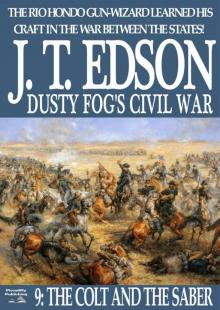 Dusty Fog's Civil War 9
Dusty Fog's Civil War 9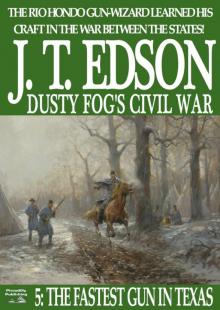 The Fastest Gun in Texas (A Dusty Fog Civil War Book 5)
The Fastest Gun in Texas (A Dusty Fog Civil War Book 5)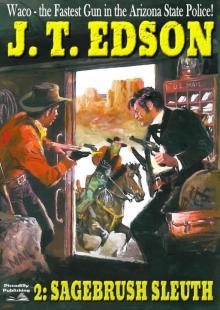 Sagebrush Sleuth (A Waco Western #2)
Sagebrush Sleuth (A Waco Western #2)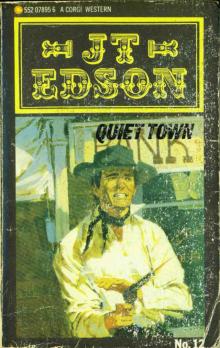 Quiet Town
Quiet Town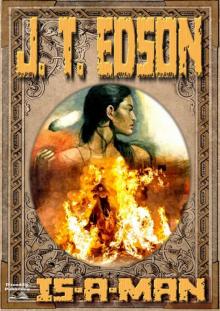 Is-A-Man (A J.T. Edson Standalone Western)
Is-A-Man (A J.T. Edson Standalone Western) Rockabye County 5
Rockabye County 5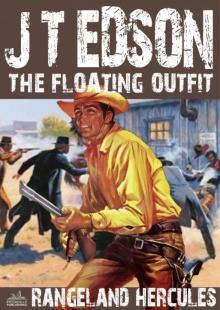 The Floating Outfit 14
The Floating Outfit 14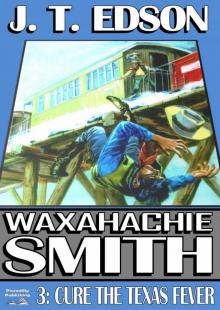 Cure the Texas Fever (A Waxahachie Smith Western--Book 3)
Cure the Texas Fever (A Waxahachie Smith Western--Book 3)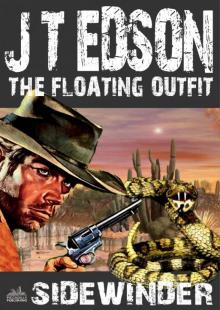 The Floating Outfit 13
The Floating Outfit 13 The Road to Ratchet Creek
The Road to Ratchet Creek